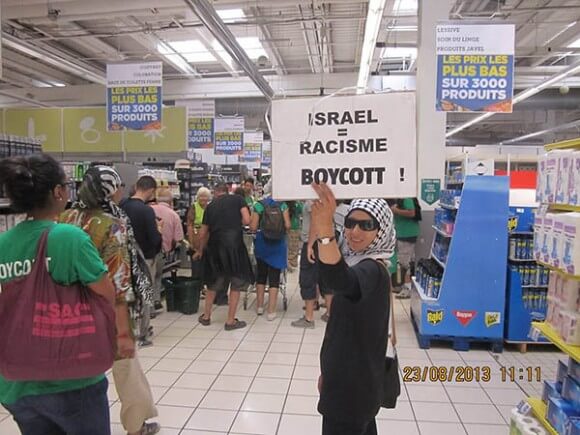
“As a consumer and as a citizen, I refuse to purchase Israeli products so long as Israel fails to respect international law; I am also calling on my fellow citizens to do the same in order to bring pressure upon Israel to dismantle the separation wall and the settlements.”
For having made such statements in the street or in shops, or for having written them in magazines or posted them on the internet, nearly 100 individuals have faced criminal charges in French courts. They are members of organizations that support the boycott, divestment and sanctions (BDS) campaign. They have been indicted by prosecutors following instructions contained in an internal text issued by the Ministry of Justice on 12 February 2010, the so-called “Alliot-Marie circular”, named after the Minister of Justice, Michèle Alliot-Marie.
The circular requests prosecutors to bring criminal charges against individuals who call for boycotting Israeli goods. It asserts that Article 24, line 8 of the 1881 law on the press allows the punishment citizens or organizations who call for the boycott of goods from a country whose policies they criticise. The circular interprets the law extensively, in contradiction to the principle of the strict interpretation of criminal law.
In fact, Article 24, line 8 of the 1881 law does not refer to the suppression of boycotts, but only of provocations “to discrimination, hatred, or violence against an individual or a group of individuals on the basis of their origins or their belonging or not belonging to an ethnic group, a nation, a race, or a specific religion.”
The Alliot-Marie circular has been criticized by organizations on the grounds of freedom of expression. It has also been criticized by numerous jurists, academics, lawyers, and judges, on the grounds of its content, which misuses a law intended to combat racist and anti-semitic remarks. Certain prosecutors have gone so far as to refuse to call for BDS activists to be found guilty, in spite of the written instructions of their superiors.
In 2012, the Paris appeals court acquitted defendants, considering that the remarks for which they were being tried represented peaceful criticism of the policies of a State. The European Court of Human Rights, for its part, regularly reminds European states that activist groups are entitled to enhanced protection of their freedom of expression when it comes to political issues. Christiane Taubira, the present Minister of Justice, has acknowledged that the Alliot-Marie circular’s interpretation of the law might be considered “unjust” or “abusive”.
These facts, together with the change of parliamentary majority in 2012, led many of us to hope that the absurdity of this situation would lead to a change in policy. But the Alliot-Marie circular of 2010 remains in vigor and criminal charges continue to be brought against BDS activists. France has thus acquired the dubious distinction of being, along with Israel, the only country to criminalize a peaceful and civic initiative which calls for the respect of international law.
Boycott is a peaceful initiative, limited to appeals to the conscience of consumers and retailers. No form of constraint has been applied to customers or retailers in France, or to Israeli producers and supplers. In France, calls for boycott have for decades been a feature of the republic’s political debate. Madame Taubira herself referred to boycotts as a “recognized and public form of activism” and admitted to having encouraged the boycott of South African goods, in the context of an international campaign that no one at the time would have dreamed of criminalising.
Boycott is a civic initiative: it is based on a mobilization of civil society. The BDS campaign began in 2005 at the request of 172 Palestinian organizations and trade unions. It calls on civil society around the world to bring pressure to bear on Israel.
Numerous organizations in France have joined the Palestinian call. Their actions are peaceful, consistent with freedom of expression and address a topic of international importance. Their actions do not discriminate against Israeli citizens; they seek to boycott Israeli institutions and goods in order to change the policies of the state.
Finally, boycott is an initiative to promote respect for international law: its goal is to obtain adherence to United Nations resolutions and the end of actions declared illegal by the International Court of Justice in the Hague, in its opinion of 9 July 2004, namely the construction of the separation wall and of settlements in the West Bank and East Jerusalem. The mobilization of civil society has been indispensable, because governments have done practically nothing to secure Israel’s respect for international law.
Nothing could be further from the truth than to suggest that the BDS campaign is racist or anti-semitic. This claim is analogous to the rhetoric used in the 1970s and 1980s against anti-apartheid activists, who were compared to irresponsible Marxist-Leninists or anti-white racists. No BDS activist brought to trial since 2010 has been charged with making racist or anti-semitic remarks or with committing racist or anti-semitic acts. It is time to abrogate the Alliot-Marie circular.
The original French version of this article appeared in the print version of Le Monde dated 6 March 2014.


”For having made such statements in the street or in shops, or for having written them in magazines or posted them on the internet, nearly 100 individuals have faced criminal charges in French courts.”
Fascism.
And the French government doesn’t see the insanity of this?
O.K., this is where if I were a Jew I actually would start being afraid of some nation’s population turning on me ———>having people punished as ‘criminals’ by their government for being or saying anything against anything Jewish related.
“In 2012, the Paris appeals court acquitted defendants, considering that the remarks for which they were being tried represented peaceful criticism of the policies of a State.”
That acquittal on 2 separate cases was contested by the prosecution and subsequently overturned at the appeals court of Colmar on November 27, 2013 with heavy fines and a suspended 2 year jail sentence imposed on the 12 accused BDS activists for having provoked an incident at the Carrefour Supermarkets a couple of years earlier .
That reversal was submitted by the activists to La Cour de cassation, (court of final appeal) where the 2 cases are still to be reviewed. So the 2 cases are still open and the activists are not out of the woods yet.
Current Justice Minister Christiane Taubira agrees that the Michèle (I love Israel)Alliot-Marie interpretation in 2010 of the 1881 law that is directly aimed at BDS activists campaigning against Israel is abusive, but she still hasn’t done anything about it. She discussed it with students last December:
http://www.youtube.com/watch?v=s1QvZgLhKx0
Zionists really seem intent on making Jews loathed throughout the world by associating them with these attacks on civil liberties.
The EU Framework Decision on Xenophobia and Racism make it every bit as criminal for Zionists to publicly condone, deny, or trivialize war crimes and crimes against humanity that target Palestinians. The BDS Movement needs to add pillaging and other serious crimes to its existing narrative about illegal population transfer.
For example, the international BDS movement is losing some key communications battles because it is framing everything in terms of illegal population transfer, instead of pillage of property and forfeiture of the proceeds from that crime, e.g. the secondary boycott case in the UK:
— http://www.algemeiner.com/2014/02/10/uk-zionist-federation-applauds-supreme-court-decision-to-uphold-ahava-four-convictions/
The demonstrators were engaging in civil disobedience and would have probably been found guilty of trespassing in any event, but the Court was NOT presented with any arguments about the retailer profiting from the crime of pillage. The UK is a contracting state party bound by the terms of Article 28 of the Hague rules of 1907. General Allenby applied the rules and the Hague Convention to the OETA of Palestine. The UK is also bound by Article 33 of the 4th Geneva Convention, and Article 8(2)(e)(v) of the Rome Statute. It has its own domestic statute that requires investigation of proceeds from ICC crimes and identifying the extent or whereabouts of property derived directly or indirectly from an ICC crime: http://www.legislation.gov.uk/ukpga/2001/17/section/37
Similarly, 18 U.S. Code § 2441 – War crimes made pillaging, as defined by Article 28 of the Hague rules, or Article 147 of the 4th Geneva Convention a federal crime that preempts any conflicting state law. Proceeds from the crime can also subject to the provisions of federal law, e.g. 18 U.S. Code Chapter 95 – RACKETEERING: 18 U.S. Code § 1956 – Laundering of monetary instruments, and 18 U.S. Code § 1957 – Engaging in monetary transactions in property derived from specified unlawful activity.
* http://www.law.cornell.edu/uscode/text/18/1956
* http://www.law.cornell.edu/uscode/text/18/1957
Charges of pillaging have been leveled in several of the indictments in the cases currently pending in the ICC, i.e. Republic of the Congo: Germain Katanga, Bosco Ntaganda, Callixte Mbarushimana, Sylvestre Mudacumura, and Mathieu Ngudjolo Chui; Central African Republic: Jean-Pierre Bemba Gombo; Uganda: Joseph Kony, Vincent Otti, Okot Odhiambo and Dominic Ongwen; Darfur, Sudan: Ahmad Muhammad Harun (“Ahmad Harun”), Ali Muhammad Ali Abd-Al-Rahman (“Ali Kushayb”), Omar Hassan Ahmad Al Bashir, Bahar Idriss Abu Garda, and Abdel Raheem Muhammad Hussein.
The people who take part in this boycott acts don`t seem to understand how it risks them. There is a growing anti-Moslem trend in a wide range of European countries and disruptions in private French commercial outlets – seemed as sheer lawlessness to many there – only add fire to that. In addition, it pushes the French Jews to the anti-Moslem front and that is not a small thing. For instance, influential Jewish French philosophers, who are otherwise sensitive to minority discrimination because of past bitter experience of Jews in such regards, are not supporting the Moslem case and some even turned against them. In contrast, Martin Luther King was surrounded in the US by Jews in the various committees that he formed and a great deal of financial support for the big marches, – both essential for his success – came from Jewish individuals and organizations.